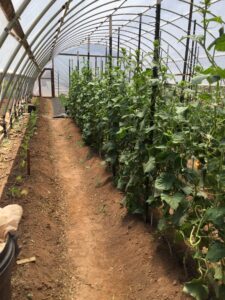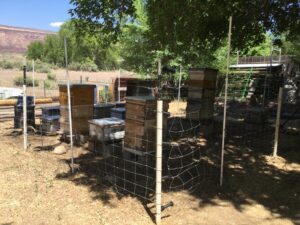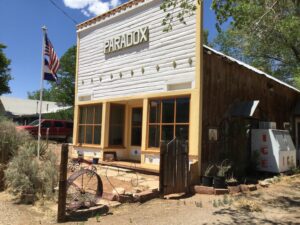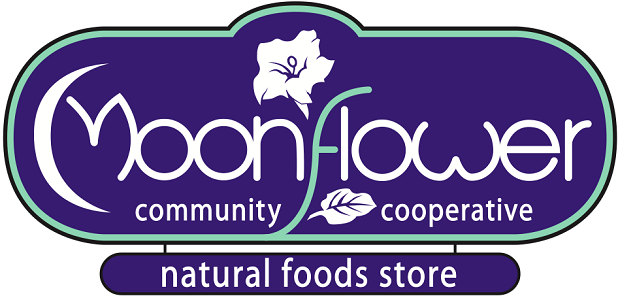by Stephanie Hamborsky, Moonflower Co-op’s Community Outreach & Events Coordinator
Humility, tenacity, and deep compassion. Greg Spaulding and Marty Warner, dedicated farmers of Colorado’s Paradox Valley and active members of the Paradox community, embody these characteristics in all aspects of their lives. On June 21st, 2018, I spent a couple hours learning more about these inspiring humans and their impressive farming and beekeeping operations. They only work with wild honeybee colonies by setting several traps in the area.


Driving into Paradox to meet them at their farmstead required traversing along steep switchbacks and somewhat treacherous segments of road under construction. I greeted Greg and Marty and immediately felt welcome. We discussed their individual journeys that led them to Paradox and their motivations for farming, especially in a contemporary food system which presents challenges to the average small-scale farmer. Marty explained, “We’ve got the produce and beekeeping, which is all we really thought we would be doing at this point, but…” Greg finished her sentence, admitting, “We’re gluttons for punishment.” In addition to their farming ventures, Greg and Marty engage in “mud rescues,” which entails picking up stranded mountain bikers who encounter storms while riding. They also manage the Paradox Valley Inn, an off-grid bed and breakfast operation, and own the Paradox Mercantile (pictured below), the town’s former Post Office building that they hope to remodel and open up as a public produce stand, similar to Castle Valley Farm’s honesty-based on-site produce store. At one point, I asked if they ran the town itself, and Marty replied, “Well, I did get elected to the Fire Protection District.”

Marty and Greg both grew up with a deep admiration for and gravitation toward growing food. Marty, a Midwesterner born and raised on a farm in Ohio, moved to Manhattan immediately after high school and eventually landed in the Hudson Valley. She worked on Moody Hill Farms, the largest certified organic farm in New York State. Founded by compost expert Karl Hammer, they boasted a massive composting operation using scraps from the nearby Culinary Institute of America and used coffee grounds from Nestle’s. They sold produce to several dozen New York City restaurants and distributed compost and soil blends along the east coast. Moody Hill Farms’ compost and soil operations would eventually evolve into McEnroe Organics. Greg grew up in the Montrose Country region and spent a substantial amount of time in the area despite moving around often as the child of a military father. He attended high school and college in Indiana but continued spending time in western Colorado. He decided that he wanted to permanently reside in the area instead of merely visiting on occasion. He worked in the forestry field for about 10 years. Ultimately, they both ended up in Lake Powell. She decided to follow the splendor of the southwest and accepted a temporary job there, where she met Greg. She noticed the abundance of potted peppers and tomatoes on his small porch when she first visited him and thought, “Uh oh… this might be him.” They bonded over their passion for growing food and decided to dedicate their lives to farming.
As they began their quest to establish a farm, they settled on Paradox, one of the most affordable areas throughout the region, from southeast Utah to western slope Colorado. Fortunately, they own water shares in the spring, which often remain unaffected by fluctuating drought patterns. They were impacted heavily by the 2008 financial crisis, and Greg faced the consequences of the boom and bust cycle of the mining industry and lost his job. They decided to reinvent themselves and focus primarily on growing produce and beekeeping. They typically grow produce year round, focusing on lettuce, cucumbers, and several nightshade varieties. They did sell at farmers’ markets for several years in Norwood, CO but ultimately decided to focus on selling to Moonflower Co-op and local restaurants through USU Extension’s Farm-Check-Fork program developed by Shiree Duncan.
Greg and Marty, like many farmers with small-scale, sustainable, and chemical-free operations, experience the impacts of the industrialized food distribution system. They struggle to compete with distributors who have monopolized both the conventional and organic produce markets, but they continue to dedicate themselves to producing nutritious, tasty vegetables for their local community. By adapting to the challenges of the food system and experimenting with different models, techniques, and ideas, they continue to grow and thrive within a challenging profit-driven system. They plan to construct another greenhouse and work toward opening their Paradox Mercantile in the near future. Anyone can visit Moonflower Co-op to buy some of their lovingly cultivated produce and directly support the dedicated growers in our local foodshed.
